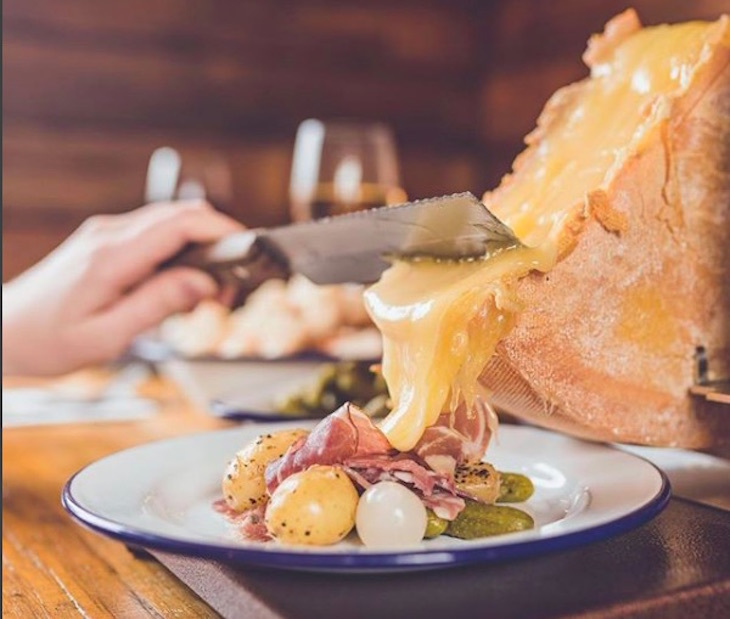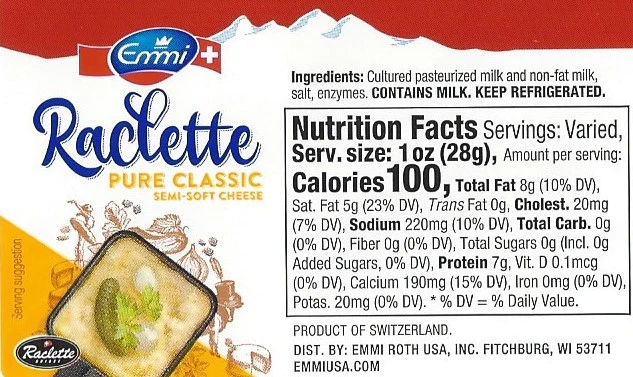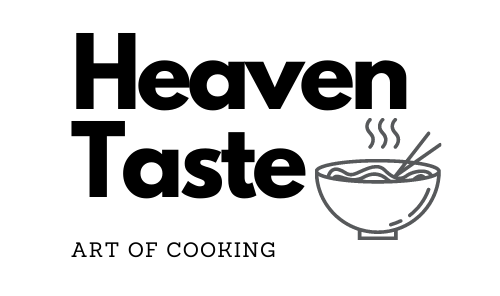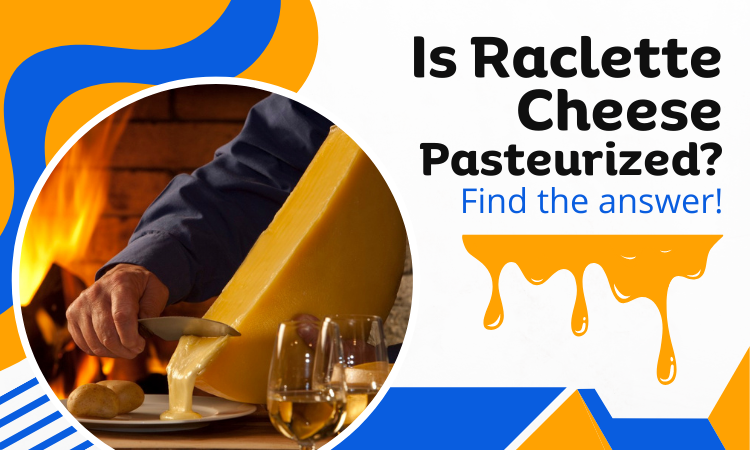Raclette cheese is as enjoyable to cook with as it is to eat. Raclette is often melted in a raclette machine and then lavishly scraped over a variety of meats and veggies.
So, is raclette cheese pasteurized?
Raclette cheese can be both pasteurized and unpasteurized, and the cheese label should clearly indicate whether it is made from pasteurized milk or not. Remember, consuming unpasteurized raclette cheese can pose a risk of bacterial diseases, especially for pregnant women.
Read the full article to find out more information about raclette cheese.
Is Raclette Cheese Pasteurized?

Raclette cheese can be made from pasteurized or unpasteurized milk.
Raclette is a semi-hard cheese that is easily meltable and made from cow’s milk. It can also be produced from thermized or raw milk, with a maturation period of about 3 months. Raclette made from sheep’s milk is also popular.
When buying cheese, it is essential to check the label to ensure whether it’s pasteurized or unpasteurized.
While pasteurized raclette cheese is safe to consume, unpasteurized cheese can pose a risk of bacterial diseases, especially for pregnant women.
Therefore, it’s crucial to confirm whether the cheese being served at a restaurant is pasteurized or not before consuming it.
How Can You Tell if Cheese is Pasteurized?

To tell if cheese is pasteurized, check the label or ask at the market or restaurant.
Cheeses made from pasteurized milk are heated to eliminate harmful bacteria, while those made from raw milk are not.
Raw milk cheese may have a stronger taste and richer texture but also carries a higher risk of bacterial contamination.
Pasteurized milk cheese is safer and an excellent source of calcium, vitamin D, and protein. When in doubt, opt for pasteurized cheese to ensure safety.
Is All Pasteurized Cheese Safe During Pregnancy?
No, not all pasteurized cheese is safe in pregnancy. Although pasteurization kills most bacteria, some types of cheese can still pose a risk of harmful bacteria growth.
Which Cheese To Avoid During Pregnancy?
Soft cheeses with a white rind, such as Brie and Camembert, and soft blue-veined cheeses, such as Gorgonzola and Roquefort, should be avoided.
These types of cheese can provide an environment for harmful bacteria, such as Listeria, to grow. And this can lead to listeriosis, which can potentially cause miscarriage, stillbirth, or severe illness in a newborn baby.
Here is a short list of cheeses that are to avoid during pregnancy:
- Fresh cheeses
- Soft cheeses made from raw or non-pasteurized milk: such as Brie, Camembert, and Emmental made from raw milk
- Soft cheeses with mould rinds: Chavignol, coulometers
- Blue cheese: Auvergne blue, Gorgonzola, Roquefort
- Semi-hard cheeses made from raw or non-pasteurized milk
- Feta cheese
How to Make Cheese Safe for Pregnant Women?
If you want to eat cooked soft cheeses, make sure they are thoroughly cooked until they’re steaming hot all the way through. And remember, heat can burst milk but not cheese.
Soft cheeses include Brie, Camembert, and Chevre. Cooked soft blue cheeses, such as Gorgonzola or Roquefort, should also be cooked thoroughly. This should kill any bacteria in the cheese, making it safe to eat.
Which Cheese to Eat During Pregnancy?
The following cheeses are safe to eat during pregnancy:
- Among the cheeses made from pasteurised milk such as mozzarella, ricotta, and mascarpone.
- Pressed cooked cheeses
- Cheese with a maturing period of more than 6 months
Summary:
- Avoid unpasteurized cheese and choose pasteurized dairy products.
- Prioritize food safety and read labels to ensure that the cheese is made with pasteurized milk.
- Hard cheeses contain less moisture than soft cheeses, making them less conducive to bacterial growth. Hard cheeses like Cheddar, Parmesan, and Stilton are safe to eat during pregnancy, even if they’re made with unpasteurized milk.
- Other pasteurized soft cheeses are safe to eat. These cheeses include cottage cheese, mozzarella, feta, cream cheese, paneer, ricotta, halloumi, goats’ cheese, and processed cheeses like cheese spreads.
Why Unpasteurized Cheese should be Avoided?
Unpasteurized cheese poses a risk of bacterial growth. It’s crucial to keep unpasteurized cheese in the refrigerator to prevent bacterial growth, as bacteria can multiply rapidly in it.
Freezing unpasteurized cheese can pause bacterial growth, but it won’t eliminate bacteria entirely. Some bacteria can survive and thrive even in cold temperatures as low as 4 degrees Celsius.
Consumption of unpasteurized Raclette cheese can result in two diseases that can be transmitted to an unborn child:
Toxoplasmosis is caused by the Toxoplasma gondii parasite, which can be present in unpasteurized Raclette cheese.
Listeriosis is a severe illness caused by the bacteria Listeria, which can be present in unpasteurized Raclette cheese. Listeria thrives in raw cheese, making unpasteurized cheese more susceptible to contamination.
Pregnant women should avoid unpasteurized Raclette cheese to prevent fetal contamination and potential preterm delivery caused by illness after maternal ingestion.
It’s always best to prioritize food safety and choose only pasteurized dairy products.
Note: To ensure safe and clean food preparation, it’s important to clean your kitchen counters thoroughly before handling any food. For tips on how to clean your counter before rolling dough, check out our guide here on clean your counter before rolling dough.
FDA National Cheese Law
The risk of consuming harmful bacteria from cheese is higher when the cheese is made from unpasteurized milk.
To ensure cheese safety, the FDA has clear national laws about cheese production, importation, and sale.
Cheeses made from unpasteurized milk can only be sold if they are aged for more than 60 days. This allows harmful bacteria to be killed by aging.
If a cheese is less than 60 days old, it must be made of pasteurized milk to prevent the growth of harmful bacteria.
These laws apply to all types of cheese sold in the United States.
It is important for consumers to pay attention to the type of milk used in cheese production and choose pasteurized options whenever possible.
Pasteurized Raclette Cheeses During Pregnancy
During pregnancy, it is important to pay close attention to what you eat. Fortunately, pasteurized Raclette cheese is safe for pregnant women to consume and retains some of its nutritional value. This cheese is prepared at high temperatures, which eliminates any potentially harmful bacteria.
Here are the recommended daily requirements for some important nutrients for pregnant women:
| Nutrient | The daily requirement for a pregnant woman |
| Calcium | 1200 milligrams(mg) |
| Protein | 70-100 grams(g) per day. Increasing Each trimester |
| Folate | 600-800 micrograms |
| Iron | 27mg |
One 20-gram slice of Raclette cheese contains 100mg of calcium, 5g of protein, 5g of fat, 15mg of cholesterol, and 160mg of sodium.
This means that a single slice can cover 10% of a pregnant woman’s daily calcium needs. Additionally, it provides 5g of protein, which is 7-10% of the daily requirement.
While the slice does contain some sodium and fat, consuming it in moderation can provide a healthy and nutritious addition to a pregnant woman’s diet.
In summary, Raclette cheese made from pasteurized milk is a safe and nutritious option for pregnant women.
A 20-gram slice can provide a significant amount of calcium and protein, which are essential nutrients during pregnancy. However, as with any food, it is important to consume Raclette cheese in moderation and as part of a balanced diet.
Frequently Asked Questions (FAQs):
Does Heating Cheese Pasteurize It?
Yes, heating cheese pastuerized it. Pasteurized cheese is made by heating milk to a temperature of around 65 ° C (149 ° F). Any potentially dangerous pathogenic microorganisms are eradicated by this method.
Is Raclette Okay to Eat If You Are Lactose Intolerant?
Yes, it’s completely okay to eat raclette if you’re lactose intolerant. In the heating and maturing process, lactose in the milk is broken down, making this cheese almost lactose-free.
What does raclette cheese taste like?
Raclette cheese has a distinctive nutty and earthy flavor, with a slightly sweet and creamy taste. It also has a rich, buttery texture that melts smoothly when heated. Overall, its flavor profile is quite mild and subtle, making it a versatile cheese that can be used in a variety of dishes.
Conclusion
So, is raclette cheese pasteurized? Raclette cheese can be both pasteurized and unpasteurized form.
But unpasteurized cheese should avoid due to its bacterial issues. Also, unpasteurized cheese can be dangerous for the pregnant woman.
My discussion is over now, keep healthy by choosing pasteurized raclette cheese.




